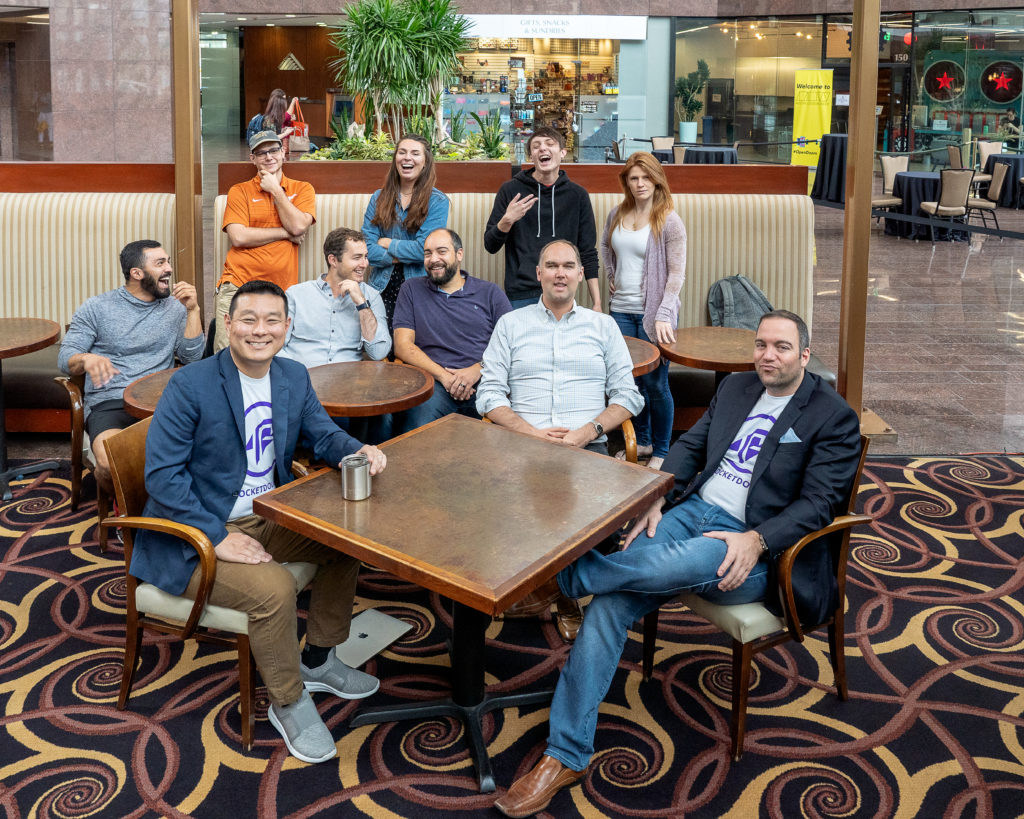
h
By LAURA LOREK, Publisher of Silicon Hills News
In a historic office building close to Capital Factory in downtown Austin, Rocket Dollar is disrupting the way people invest retirement dollars.
The two-year-old startup allows people to use self-directed retirement accounts to make a wide variety of investments into real estate, startups, precious metals and more.
“Eighty million people have over $50,000 in a retirement account today,” said Henry Yoshida, Rocket Dollar’s Co-founder and CEO. That represents $10 trillion in just IRAs, he said. “Our goal is to let people take those accounts, the money inside of them, and keep the tax benefits and invest in things that are not stocks and bonds.”
And it’s working, Yoshida said. To date, Rocket Dollar has customers from all 50 states and $50 million in assets under management coming from Rocket Dollar accounts, he said
Rocket Dollar’s lead investor is Village Global, a San Francisco-based venture capital fund that invests in early-stage startup and is backed by Billionaires like LinkedIn’s Reid Hoffman, Facebook’s Mark Zuckerberg, Amazon’s Jeff Bezos, Microsoft’s Bill Gates, Google’s Eric Schmidt and more. Rocket Dollar has raised a seed round of $3.5 million. Other investors include Capital Factory and the Central Texas Angel Network.
Yoshida, a serial entrepreneur who previously co-founded Honest Dollar, which sold to Goldman Sachs, has been busy travelling coast to coast to raise awareness about Rocket Dollar’s offering to investors, and arranging for channel partnerships. Last month, he gave a tour of his offices to those attending the Digital Banking conference in Austin. The Digital Banking conference attracts more than 1,700 senior level executives from financial institutions and FinTech providers worldwide.
In addition to founding Honest Dollar, Yoshida is an angel investor with the Central Texas Angel Network. He is also a mentor at Capital Factory and Techstars. And he’s a Certified Financial Planner and former Merrill Lynch Vice President.
“My background in Austin is I set up a lot of these 401ks here, I set up several hundred over the last 15 years on the company side,” he said. “And then I helped the individuals leaving those companies find places to establish IRAs.”
Today, Rocket Dollar only works with individuals, he said.
This type of investing has been allowed since 1978, Yoshida said. Rocket Dollar didn’t invent it, he said. But it’s largely been out of reach for most people, he said. Rocket Dollar makes it accessible and easy for the masses, he said.
“I represent a digital platform to let people achieve 21st century diversification and do something other than the set it and forget it: 60 percent stock and 40 percent bond portfolio,” Yoshida said.
Set it and forgot it is a slogan for a slow-roasted rotisserie chicken and not for the retirement industry, Yoshida said. He wrote a popular blog post about why that is not the way to manage a retirement account today.
At the Digital Banking conference, Yoshida presented a case study with its partner bank, Solar National Bank of Denver, Colorado. Its assets are held at that bank, which has a national charter. It also works with IRAR Trust, IRA Resources Inc. of La Jolla, California.
When Rocket Dollar’s assets under management hit $100 million, the startup plans to open a second office in Denver, Yoshida said. Right now, Rocket Dollar has 13 employees and a slate of interns, Yoshida said. It occupies 1,500 square feet at 221 E 9th Street.
Rocket Dollar accounts allow people to unlock their retirement dollars and invest in their communities and in startups, Yoshida said. The government prohibits people from using retirement dollars to invest in startups that they or their immediate family members control but allows them to invest in startups run by friends and more distant family members.
“You can’t invest in your company, but you can use Rocket Dollar as a way to raise money from individuals who want to take a small portion of their investment accounts and invest in a brewery or some other business,” Yoshida said. “It represents a good diversification. It might be something they have a personal attachment to it.”
It allows someone to purchase an apartment complex or invest in a partnership that own multiple properties to provide affordable housing in a community, Yoshida said.
Rocket Dollar makes money by charging a one-time $360 account setup fee and then $15 per month for account administration and compliance. It does not charge a fee for assets under management or add-on fees for new investments, according to the company.
“I make revenue from customers by giving them the ability to make their investment choices instead of making my revenue off of their investment, which is what the existing financial services industry does” Yoshida said.
Whether someone has $10,000 or $200,000 in a Rocket Dollar account, they pay the same fee, he said.
Leo Ramirez Jr., founder of Encast, opened a Rocket Dollar account to diversify his investment.
“I’m an entrepreneur and I also mentor some entrepreneurs,” he said. “I sit on two startup boards. I saw that this could be a way for me to potentially invest in their companies.”
“I think they have an amazing idea,” Ramirez said. “If I didn’t like them as much as I do, I wouldn’t keep sending friends and families to invest with them. They are changing the landscape for people looking to invest their retirement funds in diverse ways.”
